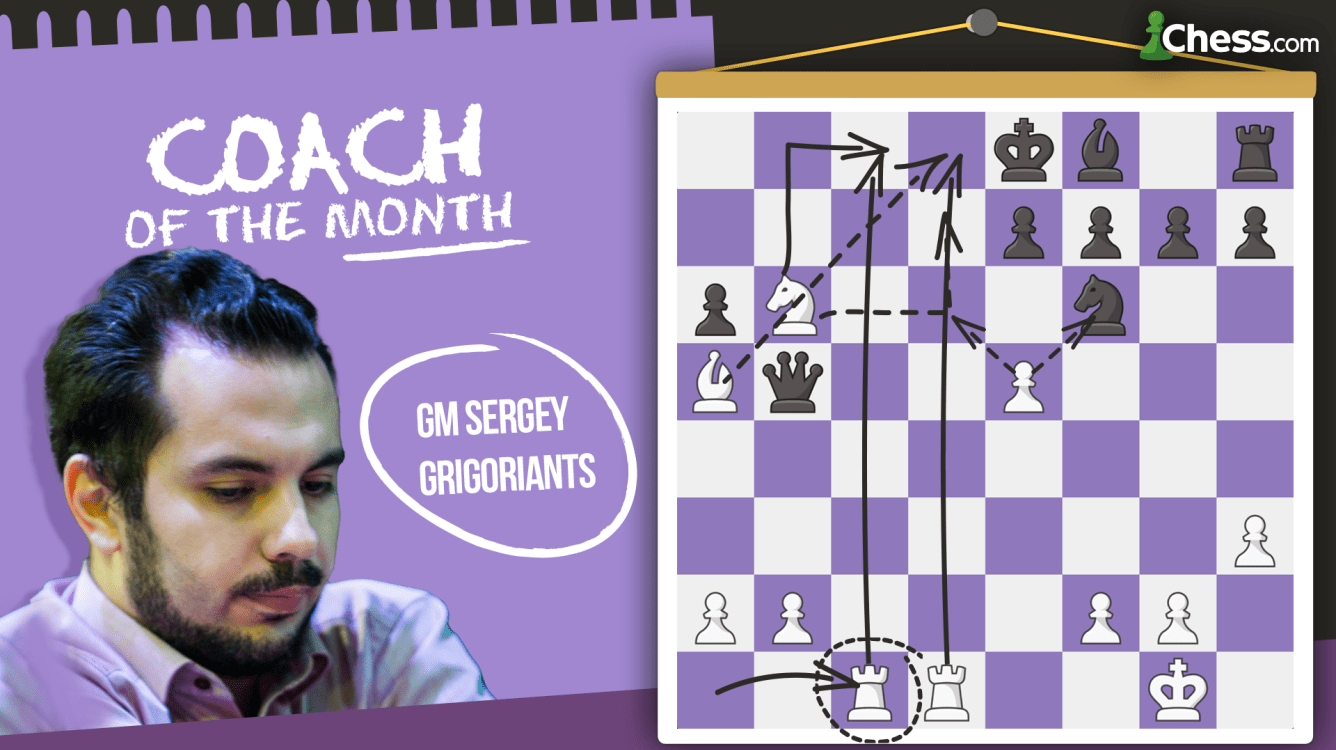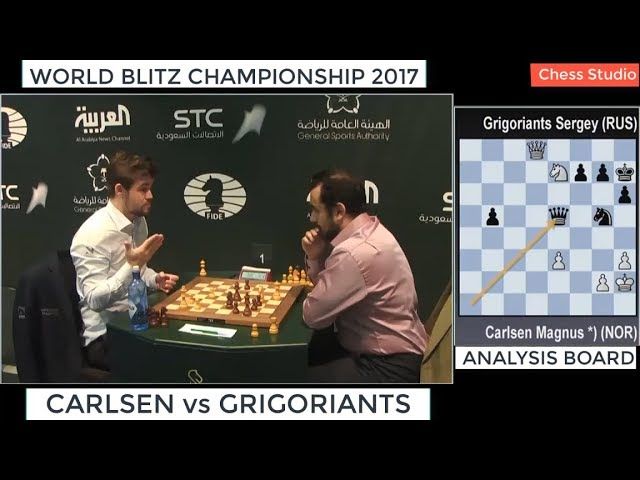
Coach Of The Month: GM Sergey Grigoriants
March's Coach of the Month is GM Sergey Grigoriants! A chess grandmaster since 2003, Grigoriants has decades of experience as both a competitive player and a highly effective coach. Keep reading for some of his best tips, puzzles, grandmaster games, and more.
Readers seeking private instruction can contact GM Grigoriants via his Chess.com profile and can find other skilled coaches at Chess.com/coaches.
At what age were you introduced to chess, and who introduced you?
My dad taught me to play chess when I was 6 years old. He played with his friends and I enjoyed watching the games, so he soon explained the rules.
What is your first vivid memory of chess?
Probably when I first played a serious game at a chess club. It was something like an exam in order to promote to an advanced group. I played White and I had a strong pawn center on e4 and d4. The opponent undermined it with c5, and my pawn advanced to d5 in response. Then the opponent was undermined by f5, but the white pawn went to e5... As a result, my pawns were safely promoted to queens, and I was promoted to a group of stronger students.

Which coaches were helpful to you in your chess career, and what was the most useful knowledge they imparted to you?
My first coach in that initial group, in which I had to break through with pawns in the center, was Anna Borisovna. An excellent coach for beginner chess players, she gave us basic ideas about chess and selected the most promising candidates for the adult group.
From about the age of seven until moving to Moscow, Larisa Sergeevna Pinchuk was my coach. We had wonderful group classes three times a week. We analyzed games, solved tactical problems, and sometimes arranged tournaments and various chess holidays. It was also the time of my first serious international competitions, including the U10 World Championship, where I shared third place.
Under the guidance of Larisa Sergeevna, I reached the level of a good master candidate, as they said at that time (ratings were not yet as popular as they are today). After moving to Moscow in 1994, my coach was the famous Soviet coach from the “Botvinnik school”, Vladimir Nikolaevich Yurkov, among whose pupils are famous grandmasters Yuri Balashov, Andrei Sokolov, Alexander Morozevich, and many others.
Yurkov developed his methodology over many years, mainly focusing on staging the opening and solving middlegame problems related to his repertoire. Under his leadership, I won the World Championships (1997) and European Championships (1999) in my age categories. Unfortunately, in 2002, this excellent coach passed away, and I did not have enough time to please him with the grandmaster title.
After that, I mainly trained in the company of friends and colleagues, who are now famous grandmasters and coaches. I should also note the sessions of the brilliant coach IM Mark Dvoretsky, in which I happened to participate several times. I still use his books and the experience he passed on to students of various levels, including the Egyptian Olympic team with strong grandmasters.

Which game do you consider your "Magnus Opus"?
This game was especially funny because I beat a strong international master without knowing who I was dealing with! I was 11 years old, it was the first round of my first strong open tournament in Moscow. I was a little late for the round and I ran into the hall and started playing. Moreover, it seemed to me by mistake that I had already played with this opponent and could easily beat him in games. So there was absolute self-confidence and, as a result, an easy spectacular victory in the style of the old masters...
How would you describe your approach to chess coaching?
I try to personalize my workouts as much as possible. First, understand your student's strengths and weaknesses, and build the training process accordingly. Today we have a huge amount of information. Still, I think it is essential to determine what can be helpful for a particular student at their unique level of training.

What do you consider your responsibilities as a coach, and which responsibilities fall on your student?
I have different categories of students, from very young players who are striving to championship heights, to those who are limited by their primary employment. Accordingly, the different goals and objectives that we solve are critical. My responsibility is to get the desired and objectively possible result for my student to achieve. Clearly, the higher the goals the student sets, the more independent work is required from them—and this will be their responsibility.
What piece of advice do you give your students that more chess players could benefit from?
Don't forget to bring pieces into play! It is strange that this rule, as simple as two plus two, is stubbornly ignored by many already quite skilled students; often in favor of thinking up some deceptively tempting alternative! And yet, it is essential to remember that pieces should be introduced into the game at all stages of play, not only in the opening.

What is your favorite teaching game that our readers might not have seen before?
Probably some endgame masterpiece by GM Ulf Andersson. The games of Ulf Andersson are very instructive in terms of chess technique and prophylactic thinking. And yet, as practice shows, most students have never seen them. My favorite game, however, is the below brilliant game by GM Viswanathan Anand.
What puzzle that you give students tells you the most about how they think?
During a period of my life, I liked to create my own chess puzzles—which is honestly quite hard. I liked to test them on my grandmaster friends as well as on some students. The puzzle below is not a well-known one, but I think it's really instructive and shows a brilliant stalemate idea:
Do you prefer to teach online or offline? What do you think is different about teaching online?
We live in the Internet reality, so basically, you must conduct online classes. That being said, I am sure an over-the-board session can be very useful. Online, there is probably less contact between the coach and the student but much fewer organizational problems.
What do you consider the most valuable training tool that the internet provides?
Access to so many good tactical tools for chess players of all levels. And high-quality materials, including those made by the world's best grandmasters.
Which under-appreciated chess book should every chess player read?
Textbook of a Chess Game by Richard Reti. A small book in which there are brilliant games, the history of chess in faces, and the philosophy of the game itself.
Are you a chess coach who's looking to find new students, build your brand, and get paid more for the work that you're already doing? Check out Chess.com's Coach Affiliate Program.
Previous Coaches of the Month:
- Isaac Snow
- IM Dagne Ciuksyte
- GM Krisztian Szabo
- WIM Mila Zarkovic
- GM Rashad Babaev
- WGM Petra Papp
- Andrey Malkhasyan
- IM Pawel Weichhold
- FM Jack Rodgers
- FM Alessandro Santagati
- FM Amir Hadzovic
- WFM Fruzsina Szente-Varga
- WIM Tijana Blagojevic
- Charlie Rosado
- GM Swapnil Dhopade
- IM Alberto Chueca
- Frank Johnson
- WGM Keti Tsatsalashvili
- IM Kostya Kavutskiy
- GM Arturs Neiksans
- FM James Canty III
- IM Levy Rozman
- CM Gabor Horvath
- AGM Colin Stapczynski
- NM Bojan Lukajic
- IM Mateusz Bobula
- IM Attila Turzo
- GM Max Illingworth


